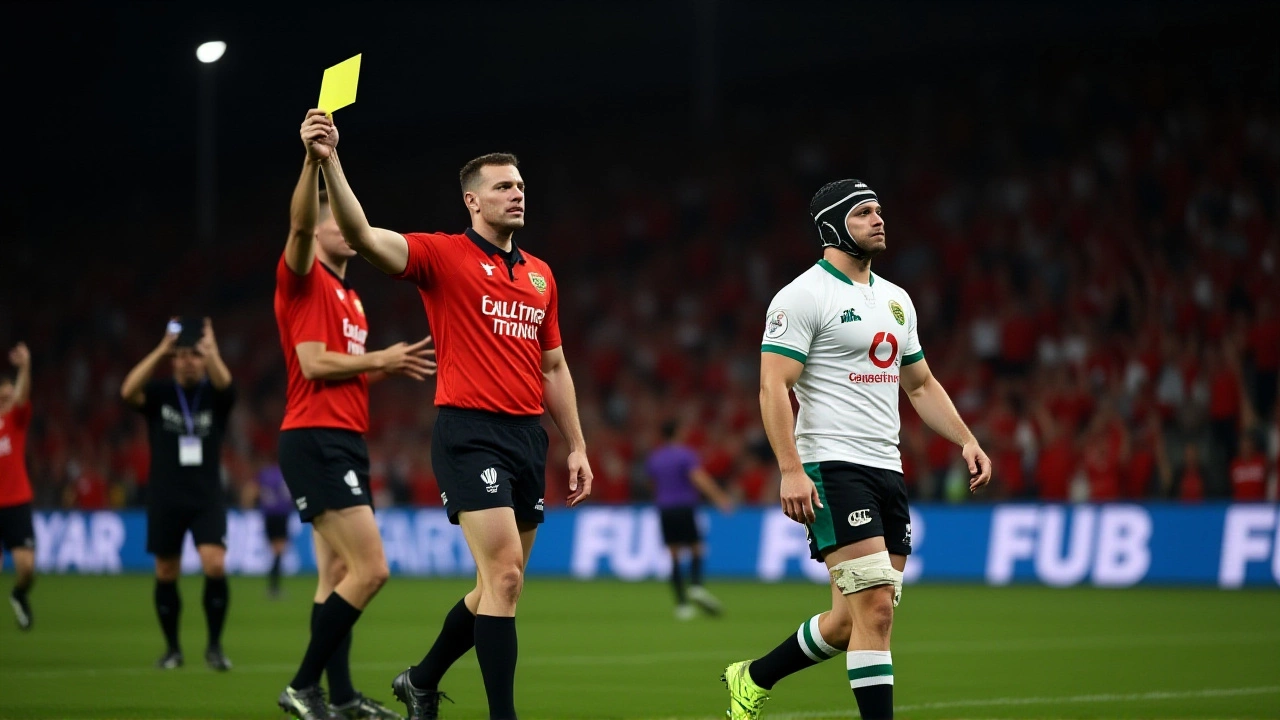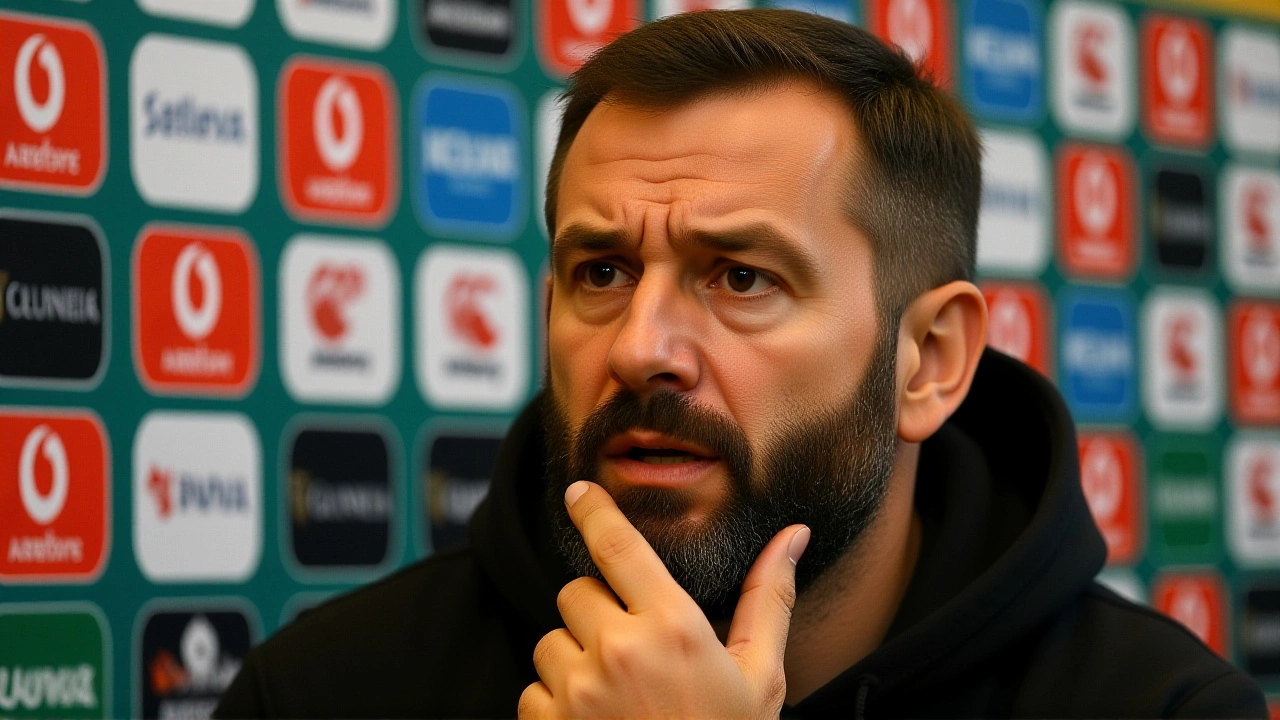
Just minutes after the Springboks secured a narrow victory over Ireland in a bruising international rugby encounter, Rassie Erasmus, the Director of Rugby and Head Coach of the South African Rugby Union, took to social media — not with a victory lap, but with something quieter, sharper. The match, played on July 6, 2024 at Munster Rugby’s Thomond Park in Limerick, ended 24-20 in favor of South Africa after a dramatic final 10 minutes that left Irish fans stunned and furious. Erasmus’s post, a single image of the team huddle with the caption “Grateful,” sparked immediate debate. But the real firestorm came from across the Irish Sea.
Referee Controversy Ignites National Outrage
The winning try — scored by Springbok winger Sbu Nkosi in the 76th minute — came after a contentious breakdown decision. Television replays showed a clear offside by Springbok flanker Siya Kolisi, yet referee Jacques Nieuwenhuis, a South African official appointed by World Rugby, awarded the try and declined to consult the TMO. The crowd at Thomond Park erupted in boos. Irish players stood frozen. The scoreline, 24-20, looked clean on paper. But the process? Not even close.
Then came Shane Lowry, the Irish professional golfer and 2019 Open Championship winner. Within an hour of the final whistle, Lowry posted on Instagram: “If that’s what we’re calling fair now, then we’ve lost more than a match. We’ve lost our respect for the game.” The post, liked over 200,000 times in 12 hours, became a rallying cry. “He didn’t just speak for Ireland,” said Irish Independent rugby columnist Eoin O’Callaghan. “He gave voice to the frustration of a generation that’s watched too many close calls go the wrong way.”
Erasmus’s Post: Confidence or Provocation?
Erasmus, known for his tactical brilliance and unapologetic demeanor, has a history of using social media as a tool — not just for celebration, but for signaling. His “Grateful” post came just 12 minutes after the final whistle. No hashtags. No names. No mention of the controversy. To his supporters, it was humility. To critics, it was a calculated silence — a refusal to acknowledge the elephant in the room.
“He knows what happened,” said former Springbok captain John Smit on Rugby Today. “He’s not dumb. He’s not blind. But he also knows that if he comments, he opens a can of worms. And right now, the Springboks are in a tournament window. He’s protecting his team.”
That’s the cold calculus of elite sport. But for Irish fans, it felt like dismissal. The match was the first between the two teams since the 2023 Rugby World Cup quarterfinal, where Ireland lost 19-16 in a similarly disputed match. This wasn’t just another loss. It was déjà vu with a referee’s whistle as the villain.
The Ripple Effect
Within 24 hours, over 12,000 complaints were lodged with World Rugby’s independent review panel. The Irish Rugby Football Union (IRFU) issued a formal request for video footage of the try-decision to be made public — a move rarely granted. Meanwhile, the South African Rugby Union quietly released a statement: “We respect the referee’s decision and thank our players for their resilience.” No apology. No clarification.
On the pitch, the implications are clear: South Africa now leads the head-to-head record against Ireland 19-14 since 2000. But off it, the damage may be deeper. A recent YouGov poll showed 68% of Irish rugby fans now distrust World Rugby’s referee selection process — up from 41% just two years ago. And with the 2027 World Cup on the horizon, the stakes are no longer just about wins and losses.

What’s Next?
World Rugby has confirmed it will review the incident, but only after the completion of the 2024 July international window. That means no action before Ireland’s next match against Argentina on July 20. Meanwhile, Erasmus has hinted — through a cryptic interview with Sport24 — that the team’s next training session will focus on “closing out games under pressure.” Not tactics. Not defense. Pressure.
For Ireland, the question isn’t just whether the call was right. It’s whether the system that allowed it still deserves their faith. For Erasmus, it’s whether silence is strength — or just another kind of surrender.
Frequently Asked Questions
Why did Rassie Erasmus’s social media post cause controversy?
Erasmus’s simple “Grateful” post, posted just 12 minutes after a match marred by a disputed try decision, was seen by many as dismissive of the officiating controversy. Fans expected acknowledgment or humility; instead, they got silence. In rugby culture — where sportsmanship is deeply valued — that silence felt like arrogance, especially after a win built on a contentious call.
Who was the referee, and why was his decision questioned?
The referee was South African official Jacques Nieuwenhuis, who awarded a try to Springbok Sbu Nkosi despite clear video evidence showing Siya Kolisi was offside at the breakdown. The TMO was not consulted, violating World Rugby’s own protocols for try-scoring incidents. This wasn’t the first time Nieuwenhuis faced criticism — he was also involved in a controversial 2023 World Cup match between Ireland and South Africa.
How did Shane Lowry’s comment impact the situation?
As one of Ireland’s most respected athletes, Lowry’s Instagram post — calling the refereeing a betrayal of the game — went viral, capturing the emotional core of Irish fan outrage. His status as a non-rugby athlete gave the comment unexpected weight, bridging sports communities and amplifying pressure on World Rugby to respond. His post was shared by the IRFU’s official account, signaling institutional backing.
What’s the history between Ireland and South Africa in rugby?
Since 2000, the Springboks lead the head-to-head record 19-14. The last four meetings have all been decided by 4 points or fewer. Three of those were decided by controversial refereeing decisions — including the 2023 World Cup quarterfinal, where Ireland lost 19-16 after a missed forward pass was ignored. This latest match continues a pattern of narrow, contentious outcomes that have eroded trust among Irish supporters.
Will World Rugby take disciplinary action against the referee?
World Rugby has confirmed it will review the incident, but only after the July test window concludes. No disciplinary action is expected before late July. While Nieuwenhuis isn’t under immediate threat of suspension, repeated errors could affect his future assignments — including potential World Cup selections. The IRFU has demanded a public explanation, which remains pending.
How does this affect the Springboks’ World Cup chances?
On paper, the win strengthens South Africa’s position in the rankings. But the controversy risks fueling a narrative of “unfair wins” — something World Rugby and broadcasters may scrutinize during the 2027 tournament. If the Springboks are perceived as beneficiaries of questionable officiating, it could impact fan support, media coverage, and even sponsorship deals. Rassie Erasmus knows perception matters as much as performance.
Leave a comments